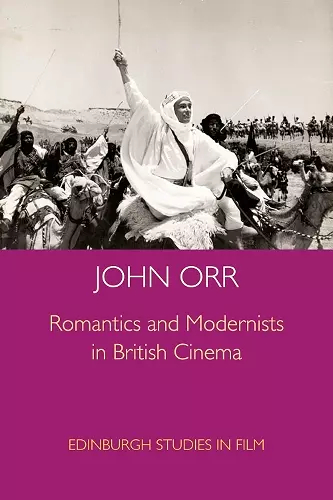Romantics and Modernists in British Cinema
Format:Hardback
Publisher:Edinburgh University Press
Published:9th Apr '10
Currently unavailable, and unfortunately no date known when it will be back

In a fresh and invigorating look at British cinema that considers film as an art form among other arts, John Orr takes a critical look at the intriguing relationship between romanticism and modernism that has been much neglected in the study of UK cinema and downplayed in the development of Western cinema. Encompassing a broad selection of films, film-makers and debates, this book brings a fresh perspective to how scholars might understand and interrogate the major traditions that have shaped British cinema history. Covering the period between 1929 and the present, this book examines outstanding directors such as Alfred Hitchcock, David Lean, Carol Reed, Nicholas Roeg, Terence Davies and Bill Douglas, and articulates two genres vital to British cinema - the fugitive film and the trauma film - which bridge the gap between romantic and modern forms. Two detailed chapters also assess the powerful impact of major expatriate directors like Losey, Antonioni, Polanski, Kubrick and Skolimowski on modernism in the 1960s and 1970s. Detailed critical readings explore Blackmail, The Lady Vanishes, Black Narcissus, Odd Man Out, The Passionate Friends, The Innocents, Lawrence of Arabia, The Servant, Blow-Up, A Clockwork Orange, Don't Look Now, The Wicker Man, Moonlighting, the Bill Douglas trilogy and The Long Day Closes. The book concludes with an analysis of the persistence of romantic and modernist forms in the 21st century in two recent prize-winning features, Control and Hunger.
John Orr's book gives the most ambitious single-author overview of British cinema since Raymond Durgnat's ground-breaking A Mirror for England 40 years ago. Not only does Orr offer much that is fresh and illuminating on film-makers ranging from Lean and Reed, through outsiders like Losey and Polanski, to Bill Douglas and Terence Davies, but he places them in a convincing overall perspective. Anyone interested in the riches of Britain's film history will gain from reading it. -- Charles Barr, Emeritus Professor, University of East Anglia Orr has already written valuable books on Hitchcock's influence and on cinema and modernity. Drawing on these, he traces a dialectic between romanticism and modernism that runs through UK cinema from the beginning of the sound era to the present - often creating a vital tension within its major filmmakers. His themes and juxtapositions are never conventional: chapters on the fugitive 'running man' and the 'trauma film' introduce important new critical perspectives, and his enthusiasms are infectious. Not since Ray Durgnat's A Mirror for England (an acknowledged inspiration) has there been such a stimulating book on cinema in the British Isles. -- Ian Christie, Professor of Film and Media History, Birkbeck, University of London. Author of Arrows of Desire: the Films of Powell and Pressburger and The Art of Film: John Box and Production Design When Orr is writing about the cinema he clearly loves most (Hitchcock, Reed, Douglas, Davies, McQueen) his own fusing of modernism and romanticism comes to the fore - clear, cogent analysis with an underlying lyricism that inspires an imaginative passion in the reader. -- Nick James Sight and Sound Romantics and Modernists retains Orr's characteristic pith and insight. What is more, with unconventional heroism it utterly dispenses with the all the notes, references, quotes and secondary evidences which buttress and clutter many a lesser tome. This is all Orr, crammed with provocative opinion and imaginative flight. It is a gem-like swansong. -- Andrew Moor, Manchester Metropolitan University Journal of British Cinema and Television Agreeably concise and superbly organised, with a brace of excellent stills to complement the text, this book provides an enjoyable, accessible read while also displaying intellectual rigour and insight. Highly recommended. -- W. W. Dixon, University of Nebraska - Lincoln Choice John Orr's book gives the most ambitious single-author overview of British cinema since Raymond Durgnat's ground-breaking A Mirror for England 40 years ago. Not only does Orr offer much that is fresh and illuminating on film-makers ranging from Lean and Reed, through outsiders like Losey and Polanski, to Bill Douglas and Terence Davies, but he places them in a convincing overall perspective. Anyone interested in the riches of Britain's film history will gain from reading it. Orr has already written valuable books on Hitchcock's influence and on cinema and modernity. Drawing on these, he traces a dialectic between romanticism and modernism that runs through UK cinema from the beginning of the sound era to the present - often creating a vital tension within its major filmmakers. His themes and juxtapositions are never conventional: chapters on the fugitive 'running man' and the 'trauma film' introduce important new critical perspectives, and his enthusiasms are infectious. Not since Ray Durgnat's A Mirror for England (an acknowledged inspiration) has there been such a stimulating book on cinema in the British Isles. When Orr is writing about the cinema he clearly loves most (Hitchcock, Reed, Douglas, Davies, McQueen) his own fusing of modernism and romanticism comes to the fore - clear, cogent analysis with an underlying lyricism that inspires an imaginative passion in the reader. Romantics and Modernists retains Orr's characteristic pith and insight. What is more, with unconventional heroism it utterly dispenses with the all the notes, references, quotes and secondary evidences which buttress and clutter many a lesser tome. This is all Orr, crammed with provocative opinion and imaginative flight. It is a gem-like swansong. Agreeably concise and superbly organised, with a brace of excellent stills to complement the text, this book provides an enjoyable, accessible read while also displaying intellectual rigour and insight. Highly recommended.
ISBN: 9780748640140
Dimensions: unknown
Weight: 458g
208 pages